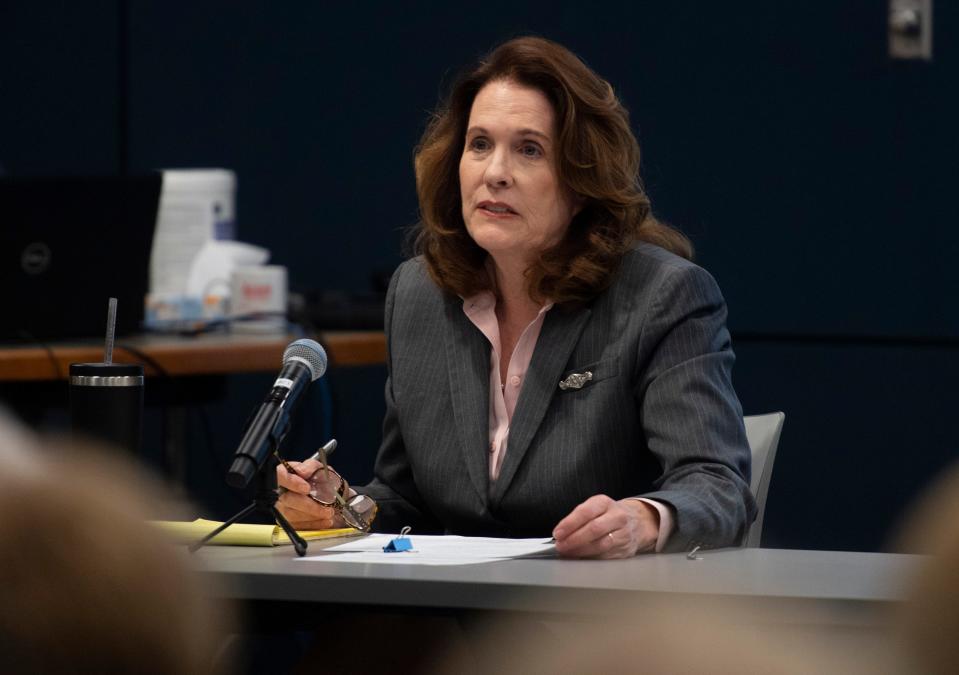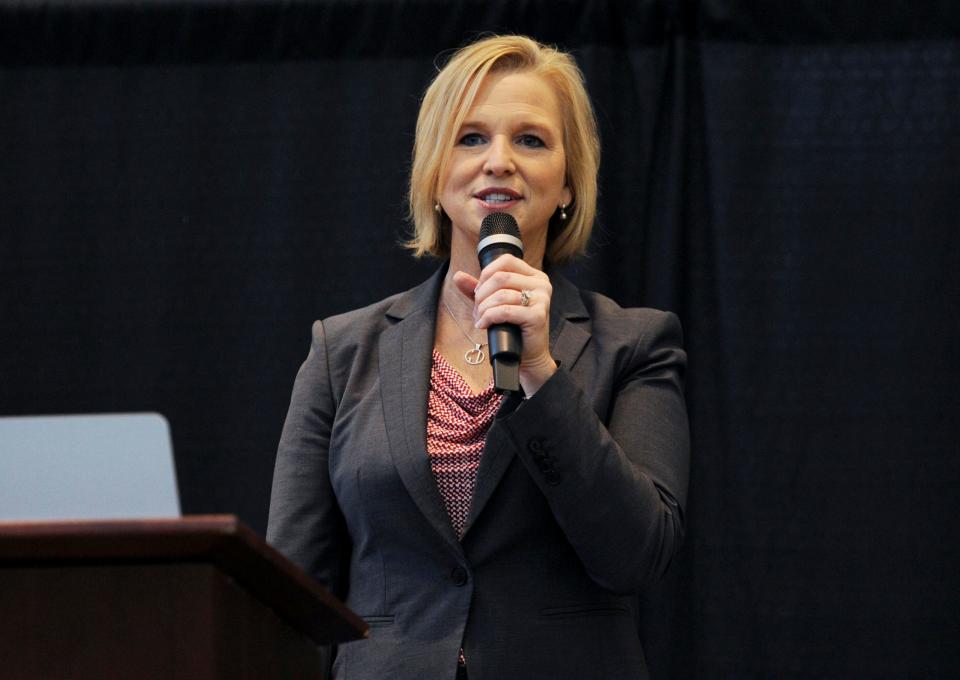Q&A: Vanderburgh County Commission candidates talk utility costs ahead of primary
EVANSVILLE — The Courier & Press asked the Republican candidates for District 3 Vanderburgh County Commissioner to share their responses to questions about local issues on residents' minds.
The District 3 seat is the only contested primary on the ballot for Vanderburgh County voters May 7.
Running are incumbent Cheryl Musgrave and challenger Amy Canterbury. Whoever wins May 7 will face Democratic candidate Hope Fussner in November.
More: Q&A: Vanderburgh County Commission candidates rate county roads, talk Lloyd4U
What can you do as a Vanderburgh County Commissioner to alleviate burden placed on residents by the rising cost of utilities?
Cheryl Musgrave: Commissioners can oppose utility rate increases and lobby the state legislature to repeal taxes on your utility usage. As commissioner, I have personally advocated against water and electric rate hikes at public hearings.
Commissioners can convene discussion of the problem of unaffordable utility bills and rate increases. As commissioner, I took the lead in organizing an Energy Summit for Southwest Indiana to raise the awareness of issues surrounding the future of energy. This type of community discussion may be more important than ever, given the changing methods of generating electricity and consequences for all ratepayers.
Commissioners can champion the end of taxing citizens on electric and natural gas bills they pay, a price that rises with the amount of the bill. The colder or hotter it is, the more state government rakes in by taxing your utility bill. Truly, state government kicks the taxpayer when they are down through this tax. Join me in sending this message to our legislators: repeal the electric and natural gas tax.

A commissioner should maintain independence from big business interests, actively listen, and advocate on behalf of the people. By staying true to these principles, I am committed to representing the interests of the people and working towards a fair utility landscape for all residents.
Amy Canterbury: I believe that our constituents need more information on the matter in a forum different than a regulatory board meeting where the utility company can present a breakdown of what the increases will cover. If the people are convinced it is needed, they will accept it. For those who cannot afford it, I would seek to develop a collaborative utility assistance system of support with our constituents, city, county, nonprofits and community leaders. Our current system of support is broken and difficult to navigate for families who are already in financial stress.

Would you support assistance programs funded by the county to help residents with utility bills?
Cheryl Musgrave: Government created the problem of high water and electric bills, and government should help those who cannot bear the burden.
The water utility is wholly owned and managed by the city of Evansville, subject to state and federal regulations. Our electric utility is an investor-operated monopoly regulated by state government.
The federal government Environmental Protection Agency callously forced the city of Evansville to correct over a hundred years’ worth of underinvestment within a short time span. This has caused rates and bonded indebtedness to soar to unaffordable levels, not just for today’s ratepayers, but for at least two generations more. And all the borrowing isn’t over; rate increases are still to come.
The federal government should contribute heavily to paying these mandated costs. After all, the federal government forced us to borrow the funds to meet federal regulatory demands; the federal government should heavily participate in the repayment of these crushing debts.
As to the electric utility, the state has the obligation to protect the ratepayers and should create a relief fund immediately. Our high electric bills are a direct result of state decisions.
If you are having difficulty paying your bill now, your elected township trustee has funds to support those in the greatest financial distress. These relief funds are generally income-based. The trustee may be aware of additional resources such as not-for-profits which may be able to help. By state statute, the county commission serves as the only level of appeal for denial of township trustee relief. If an applicant is denied relief for any reason, an appeal may be filed with the county commission and a hearing will review the action. The Commission’s decision is final.
All elected officials should work together to help those who cannot afford the rapidly increasing burden placed upon them by the weight of accumulated local, state, and federal government decisions.
Amy Canterbury: I would support a collaborative effort with our constituents, city, county, nonprofits and community leaders to determine the most cost-effective and efficient way to assist in utility costs. While there are programs available to assist, it is a difficult system to navigate. This is an issue that that is long overdue for resolution. Our families deserve a quality process that is clearly defined and easy to navigate.
More: Here's what Vanderburgh County Commission candidates have to say about growth, development
The Vanderburgh County Commission took a public stance against the currently proposed increase by CenterPoint Energy. Is that something you support doing again in the future?
Cheryl Musgrave: Yes, I am a staunch advocate for opposing utility rate increases, a stance I have demonstrated through active participation in public hearings on two occasions while representing the Vanderburgh County Commission. Recently, I represented the commission before the Indiana Utility Regulatory Commission in opposition to the proposed electric rate increase. Through a strong resolution, we issued a clear call for the denial of the rate increase and the repeal of the tax imposed on gas and electricity usage. This commitment to advocating for fair utility rates is something I will continue to support in the future.
Amy Canterbury: The role of the commission is to be a voice for the public. I would support speaking and am willing to do the work as I have stated above.
What are your thoughts on the current rates paid by county residents for service from Evansville Water and Sewer?
Cheryl Musgrave: The current rates paid by county residents for service from Evansville Water and Sewer Utility are undeniably burdensome, particularly for those residing in the unincorporated areas of the county. There exists a significant surcharge for sewer rates that city residents are not subject to, leading to a situation that has been characterized as "taxation without representation" by a former commissioner. The decision regarding these rates was made by the water department board, a body wholly appointed by the mayor of the city of Evansville. This disparity in rates highlights an issue of fairness and accountability that should be addressed by the mayor to ensure equitable treatment for all water utility ratepayers.
Amy Canterbury: County residents buy the water from the city. Clean water is expensive, and the city must replace the 107-year-old water treatment plant. I see an opportunity to partner with EWSU to better understand the cost of services and use of funds on behalf of the county. Not all county residents are on sewer; many residents are on septic. I see an opportunity to formulate a task force to investigate the possibility for the county to establish sewer district(s) to provide sewer to outlying areas of the county. For example, Burdette Park's Discovery Lodge is not on a traditional septic system. This system allows the water to be so clean that it is allowed to flow on the surface of the land. A part of any such evaluation would be to research grants and other sources to fund improvements. Regardless, collaboration with the EWSU is a must to deliver the most affordable, clean water for Vanderburgh County.
More: Here's what candidates in Vanderburgh County's only contested primary race say about crime
As a county official, how do you view your role in representing county residents in matters involving EWSU?
Cheryl Musgrave: County officials can maintain the separation of city and county governments by opposing consolidation. As we see with the surcharge on sewer rates for unincorporated residents, if consolidation were to ever occur, the city would find new ways of making the county pay for city debts and initiatives while ignoring the county resident’s needs.
Taxpayers should keep vigilant focus on the consolidation issue. It was strongly supported by big business just a few years ago. Big business continues to prefer consolidation and recruits candidates who share this vision, including in this race.
Amy Canterbury: Much of what was stated above. I will listen to our constituents and be their voice, while collaborating and investigating better ways to improve systems. Throughout my career, I have been a leader in change management, and I intend to use those skills as commissioner of Vanderburgh County.
This article originally appeared on Evansville Courier & Press: Q&A: Vanderburgh County Commission candidates talk utility costs

